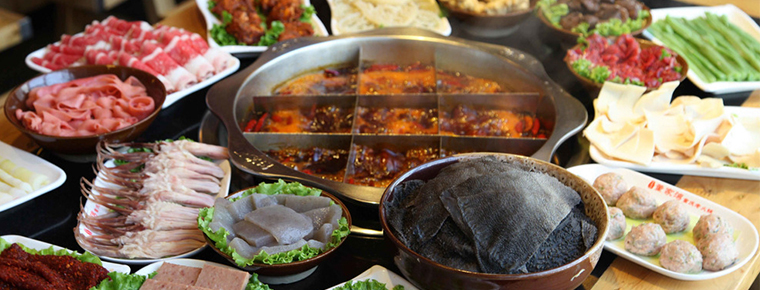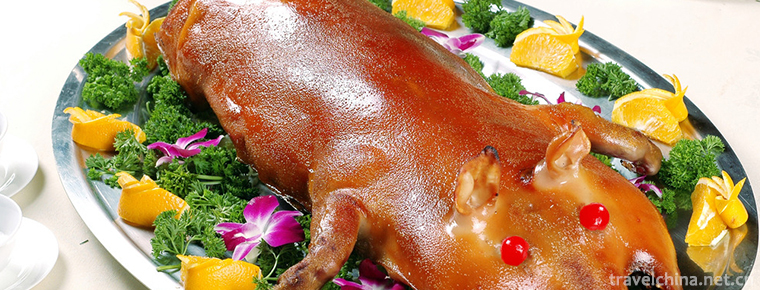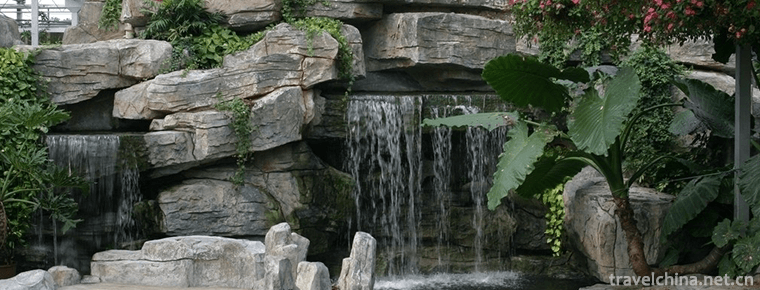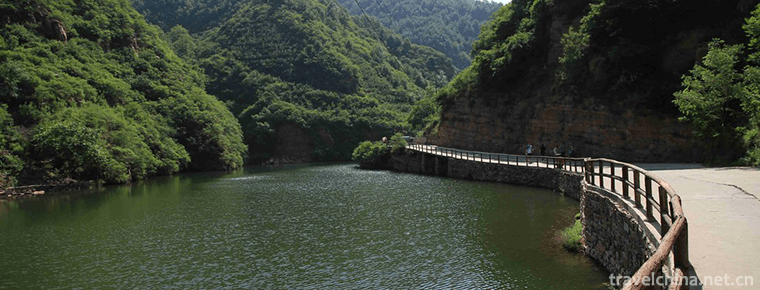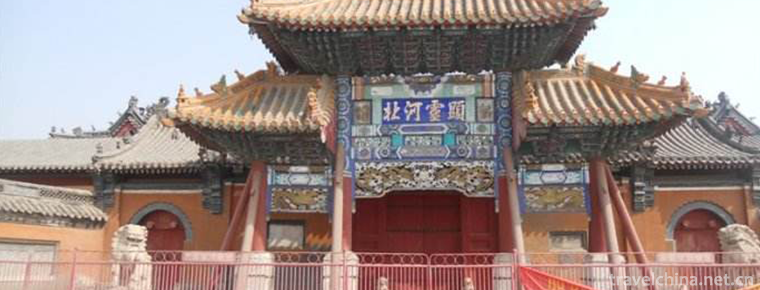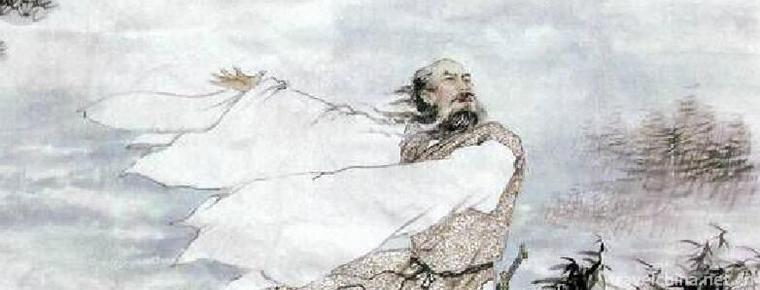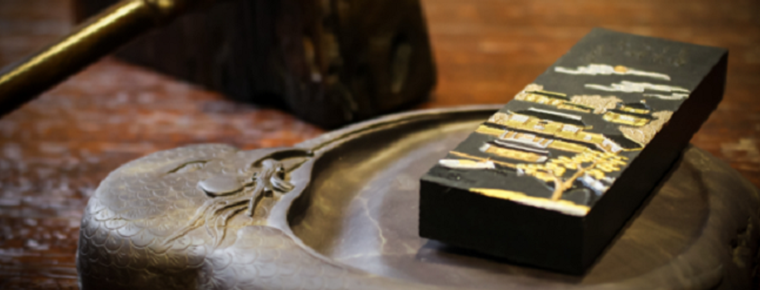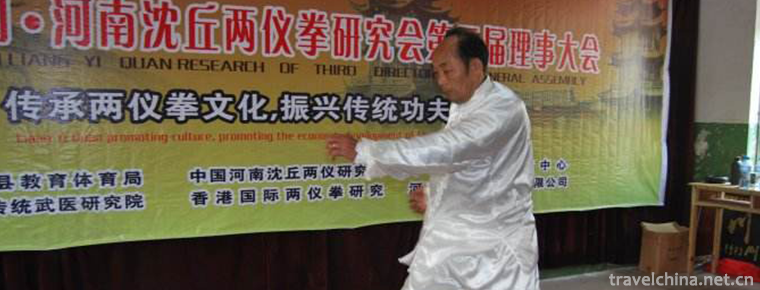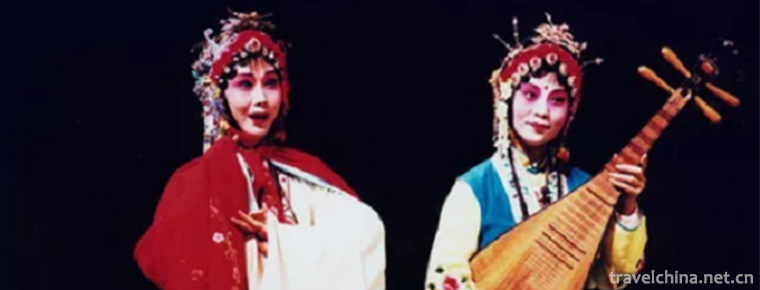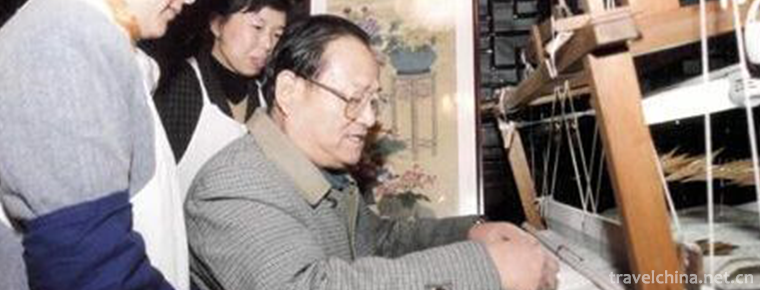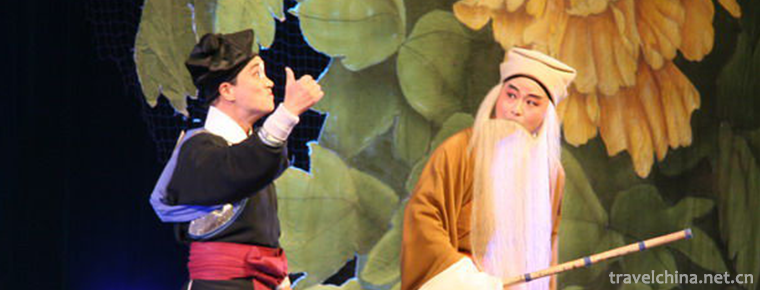Horse vaulting
Horse vaulting
Horse vaulting, a traditional sacrificial dance, is popular in Rudong, Jiangsu Province. It is a dance performed in sacrificing the "Dutian King" they believe in. Participants held "horse cuttings" (long needles) to symbolize "stakes" and hung "horse bells" on their harnesses. They compared themselves to "horses" serving God. They kept beating their feet and clanging the bells as they marched, in order to pray for God's protection. On the Birthday of Dutianwang, the villagers took Dutianwang's God-driven (sedan chair with God statue) on a tour, and the people who participated in the "vaulting horse man" always danced with God-driven before and after. Similar dynamics such as burden-bearing, boating and Net-casting often appeared in the dance, which showed the nature of fishermen, salt people and coastal peasants. Now, there is no such activities as the meeting for gods. The "vaulting horse" has been transformed from the worship of gods to the form of men's dance. The "horse cuttings" and "horse bells" have also become props for the dance.
On May 23, 2011, the vault was listed in the third batch of national intangible cultural heritage list with the approval of the State Council.
"Horse vaulting" was originally a sacrificial dance spread in Rudong area. The sacrificial God was "Dutian Wang Ye". According to legend, "Dutianwang Ye" was the title of the pursuer of Tang Suzong to Zhang Xun, his general. In October of the second year of Tang to De (757), Zhang Xun (709-757) defended the city of Weiyang (now Shangqiu Nan, Henan Province) against the rebels in Anlu Mountains. In October, all the food was spent. Narrow sparrows dug rats and fed the soldiers with hunger. When the rebels committed another offence, Zhang used his ingenious tactics to tie the sergeant's body to a horse bell and run around the city, making the rebels suspect that the reinforcements have arrived and their souls are in a state of despair. Zhang Xun died because he was outnumbered by others. Later, the court pursued feudalism, and the people built temples and offered sacrifices on their birthdays. During the Ming and Qing Dynasties, Japanese bandits often harassed the coastal areas. Local people placed their hearts on Zhang, recalled the heroes and prayed for the gods to alleviate disasters and reduce blessings. As a result, the worship gradually evolved into "burning horseback incense". This activity lasted until the early 1950s, especially in Dongfengli, Matang and Digging Harbor. In the late 1970s and early 1980s, Rudong folk dance "Horse-vaulting Fu" was included in the "Chinese Folk Dance Integration" and was able to reproduce its splendor. It was performed in Nantong, Nanjing and even in Zhongnanhai, Beijing.
Characteristic
Simple and orderly dancing, clangorous rhythm, rough shouting and even the momentum of overthrowing mountains and shaking the earth are called "Chinese disco" by foreigners. "Horse-dancing" is a group of men dancing, without music accompaniment. It mainly depends on the bell sound worn by the groom. The dance is mobile and changeable. On the stage, rows of rough and tough grooms, with bells, silver pins, red camouflage inlaid on the face of the treasure plate, hand-held horse cuttings, legs wrapped in plain cloth, straw shoes, chest suspension padlock, hollow black sole and short legs, without strabismus, dance in groups; stamp, step, swing, stride, stride, stride, stride, stride, stride, stride, stride, stride, stride, stride, stride, stride, the whole action is tough and powerful. It tells the world a moving story that frightens the enemy with the bell, praises Zhang's fearlessness in driving demons out of town, and places people's good wishes on eliminating disasters and praying for good luck. A long and deep trumpet, a slow and solemn Gong and drum, like thousands of horse bells sounding at the same time, the huge apricot yellow dragon bobbing in the wind, rendering the tragic and stirring of the ancient soldiers fighting in horses, people seem to be in the battlefield of the ancient battle between the two armies. "Ha-ha, ha-ha! Ha-ha, ha-ha!" The roar is louder and louder, and the rhythm is faster and faster. The crowds of horsemen should step with drums and change with gongs. Sometimes the birds go through the woods, sometimes the dragons spit their beards, and the formation changes rapidly. Trumpets, gongs, horse bells, and shouts are loud and earth-shaking. Sometimes they step over and hold up their cuttings as devout sacrifices. Sometimes they jump forward without hesitation. Dragon dance, hula; bell, jingle; cry to suppress the clouds, like a tiger down the hill, like a dragon out of the sea... Suddenly, all kinds of voices stopped abruptly. The whole process of "vaulting horse" ended, and the whole dance was full of martial spirit and fighting atmosphere.
The style of "vaulting horse" can be summarized in eight sentences:
The feet stand like a clock, the legs and arms bend like a bow.
Keep your chest straight and abdomen closed calmly, breathing through Dantian as loose as a fiddle.
Jump, kick, talk and move shoulder slightly.
Steady and unswerving eyes, vigorous, simple and prestigious.
humanity
Rudong actually commemorates Zhang Shicheng with the activity of "Dutianwangyuan". He had come to dig the harbor and smuggle salt at a high profit. Near the harbor, Yang Jiabang led the salt people to fight with the officers and soldiers. Use sole as a big knife to frighten off officers and soldiers. Local folk songs spread: Yang Jiabang, Yang Jiabang, the good courage to burn salt, officers and soldiers to kill, salt people rebellion. Without knives and guns, he took the sole and tied the pole, and drove the officers and soldiers to death. "Whether in memory of Zhang Xun or Zhang Shicheng, they are the memory of heroes, the respect for the spirit of unyielding struggle, and the expectation of praying for heroes, eliminating disasters and reducing blessings. In the dance, the people who play the groom with silver needles are like the warhorses of the King of Heaven. They wear horse bells and the bells ring when dancing. Everyone holds a silver cuttage in his hand, which is called "horse cuttage". The whole dance is full of the spirit of martial arts, with the desire of revering the King of Heaven, and full of strong fighting atmosphere. Nowadays, "vaulting horse" has been sublimated to the symbol of Rudong spirit. For the sake of peace and tranquility, people will persevere and go forward bravely, even if they go through fire and water.
Competition
In 2010, as one of the four performances selected by Jiangsu Province, the square dance of Rudong Horse-vaulting, a intangible cultural heritage of China, was performed by teachers and students in our school. On the morning of June 16, "Rudong Mafu" participated in the performance of the first Chinese Farmers'Art Festival at the Beijing Agricultural Exhibition Hall and won the Golden Spike Award.
In order to organize "Rudong Horse-vaulting" square dance to participate in the first Chinese Farmers'Art Festival, such as the Dongxian Party Committee and the county government allocated special funds. Jiang Xiaojing, deputy county governor, personally took the lead. The agricultural and Industrial Office of the county Party committee, the county Wenguang New Bureau and the County Education Bureau jointly organized the program's training activities. The program has been greatly adapted on the original basis. From June 1 to June 12, under the guidance of director Ren Naigui, "Rudong Mafu" has conducted closed training. During the training, the "groomsmen" did not fear the heat and worked hard. At the first Chinese Peasant Art Festival, they jumped out of the "Rudong Groomsmen" heroism and displayed the "Rudong Groomsmen" style.

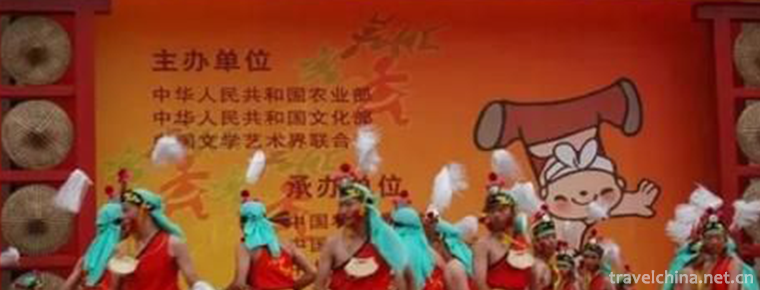
-
Gold medal suckling pig
Roasted Suckling Pig. Characteristic: It has won the "Golden Ding Award" by the national commercial department. It is a precious Cantonese dish at the banquet..
Views: 223 Time 2018-11-14 -
Tengtou Ecological Tourism Area
Embedded between Fenghua and Xikou, Tengtou Eco-tourism Area is located in Xiaojiang Plain, close to Jiangba and Yongxi Highway. Located 6 kilometers north of Fenghua City.
Views: 229 Time 2019-02-13 -
Tianhe mountain
Tianhe Mountain, located in Xingtai City, Hebei Province, is China's Love Mountain, the hometown of Chinese Qixi Culture, and the birthplace of the legend of Cowherd and Weaver Girl.
Views: 182 Time 2019-02-21 -
Anguo City
Anguo City, formerly known as Qizhou, is now the jurisdiction area of Baoding City, Hebei Province, 100 kilometers south of Shijiazhuang, the provincial capital. .
Views: 265 Time 2019-03-30 -
The Dragon Boat Festival
Dragon Boat Festival, also known as Dragon Boat Festival, Double Boat Festival, Midday Festival, Dragon Boat Festival, Zhengyang Festival, Bath Orchid Festival, Tianzhong Festival,.
Views: 99 Time 2019-04-28 -
The Making Skills of Hui Ink
Hui ink production technology, Jixi County, Shexian County, Huangshan Tunxi District, Anhui Province, local traditional handicraft, one of the national intangible cultural heritage..
Views: 81 Time 2019-05-04 -
Two instruments boxing
Liangyi Quan originated from Zhouyi, which said, "It's so easy to have Taiji. It's the birth of Liangyi". (Liangyi Quan) is also called Liangyi Point-through-Qishen Quan. Its name is formed .
Views: 166 Time 2019-05-13 -
Soviet Opera
Su Opera is a combination of Huagu Tanhuang, Nanci and Kunqu Opera. It is popular in the urban and rural areas of southern Jiangsu and Northern Zhejiang. Its predecessor, Sutan, was originally called .
Views: 72 Time 2019-06-16 -
Silk weaving skills in Suzhou
Tilting, also known as carving, is an ancient and unique traditional weaving process in China. It mainly exists in Suzhou and its surrounding areas. Since the Southern Song Dynasty, Suzhou silk has be.
Views: 344 Time 2019-06-17 -
Xi Opera
Xiju opera, one of the national intangible cultural heritages, is popular along Shanghai and Nanjing, as well as in Hangzhou, Jiahu, Huzhou and urban and rural areas of southern Anhui..
Views: 139 Time 2019-07-01 -
Introduction to Chengdu Giant Panda Base
Chengdu Giant Panda Breeding and research base (hereinafter referred to as the base) is located at 1375, Waibei panda Avenue, Chenghua District, Chengdu City, Sichuan Province, China. It is 10 kilometers away from the city center and more than 30 kilometers.
Views: 212 Time 2020-12-13
